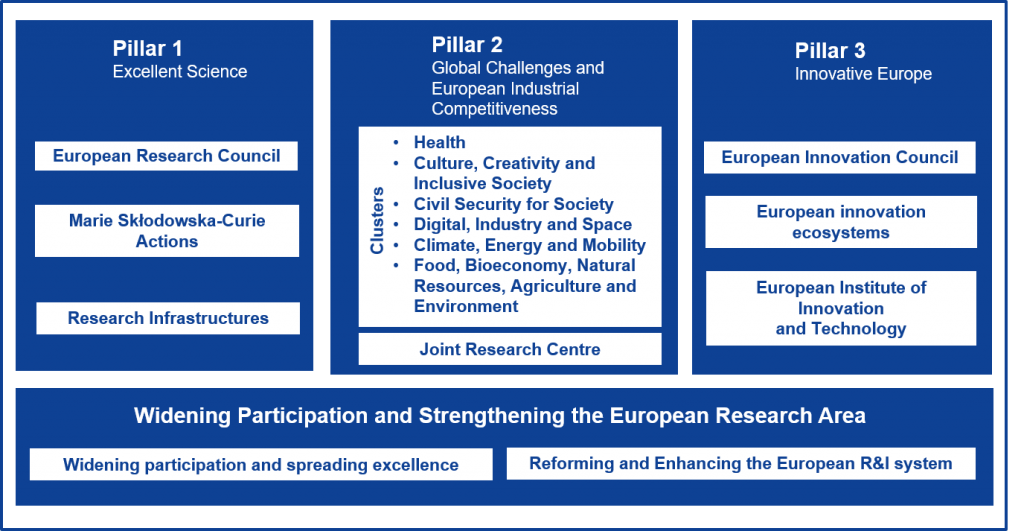Horizon Europe Draft Work Programmes 2021-2027
 Details have begun to emerge of what researchers can expect from the European Commission's next research and innovation framework programme, Horizon Europe. The final work programmes will not be published until April but the drafts give us a clearer idea of what the €95.5B programme will fund:
Details have begun to emerge of what researchers can expect from the European Commission's next research and innovation framework programme, Horizon Europe. The final work programmes will not be published until April but the drafts give us a clearer idea of what the €95.5B programme will fund:
Pillar 1 - Excellent Science
The European Research Council - The ERC will continue to award Frontier Research and Proof of Concept grants, with the first funding calls planned for 20th May. Meanwhile, Synergy Grants are unlikely to be available until 2022.
Marie Skłodowska-Curie Actions (MSCA) - In Horizon 2020, the MSCA helped develop training networks, promote staff exchanges and fund mobility programmes. We expect the MSCA to work similarly in Horizon Europe but a draft is not yet available.
Research Infrastructures - European Research Infrastructures (EU RIs) are organisations that facilitate excellent science by providing access to cutting-edge technology and resources. We are awaiting further information on EU RIs as a work programme is not yet available.
Pillar 2 - Global Challenges and European Industrial Competitiveness
Health Cluster - There are 16 calls for research planned for 2021-22. They relate to the following 6 topics: staying healthy; the environment and health; tackling diseases; access to healthcare; digital tools for health; and support for Europe’s health-related industries.
Culture, creativity and inclusive society - The cluster will focus on three areas of research from 2021-22: democracy and governance; European cultural heritage; and social and economic transformations.
Civil security for society - There will be calls for research into better protection against crime and terrorism, as well as effective management of external borders; infrastructure protection; increased cybersecurity; resilience to disasters; and strengthened security R&I.
Digital, industry and space cluster - Through fifteen research calls, the cluster will support enabling technologies which are important for Europe’s industrial future. The calls will include the following: increased autonomy in key-value chains, a secure and dynamic data-agile economy and human-centred development of technologies.
Climate, energy and mobility - In order to support the implementation of the Paris Agreement and the United Nations Sustainable Development Goals, the cluster will launch calls in six areas. According to the draft work programmes, they include cross-sectoral solutions for the climate transition, clean and competitive solutions for transport, and smart mobility services for passengers and goods.
Food, Bioeconomy Natural Resources, Agriculture and Environment - There will be 19 funding calls from 2021-22 in the following areas: biodiversity and ecosystem services; food systems, circular economy and bioeconomy sectors; clean environment; land, oceans and water; and rural, coastal and urban communities.
Pillar 3 - Innovative Europe
The European Innovation Council - Firstly, the Pathfinder will provide funding for advanced research on breakthrough technologies. Secondly, the Accelerator will enable SMEs to develop and scaleup breakthrough innovations. In addition, the Transition programme will help build on promising results from the Pathfinder or ERC Proof of Concept projects. The EIC also includes other calls and actions such as Fast Track to Innovation (FTI) and the Horizon Prizes.
Cross-cutting
Widening Participation - There are three key lines of action to boost research performance in under-performing regions: building R&I capacities, advancing the free circulation of knowledge and strengthening the European Research Area.
If you’d like more information or a copy of any of the above work programmes, please get in touch. In addition, you can subscribe to our newsletter to receive the latest information direct to your inbox.
European Innovation Agencies Make Plans to Strengthen Innovation
The European Innovation Council (EIC) and the European Institute of Innovation and Technology (EIT) have signed a letter of intent to coordinate efforts and strengthen Europe’s innovation services, pledging to build a “more integrated and inclusive EU innovation ecosystem for the benefit of EU innovators.”
Potential areas of cooperation are currently being tested in three €1 million pilot projects. The innovation agencies will finalise their collaboration in Spring 2021, before rolling it out in 2022.
Context
The EIC and EIT are complementary organisations, working towards the shared goal of translating Europe’s research strengths into jobs and growth. However, they operate in different ways:
- The EIT focuses on the integration of higher education, research, and innovation to address global challenges set in Horizon Europe. It has eight designated Knowledge and Innovation Communities, each of which addresses a specific societal challenge.
- In contrast, the EIC provides financial support for innovators. Its focus is on all areas of disruptive and breakthrough market-creating innovation.
A closer working relationship between the two institutions will enable companies from underperforming countries to secure more funding. As a result, this will help narrow the innovation gap between east and west Europe.
Significance
EU research commissioner, Mariya Gabriel, has labeled the move “a stepping stone in creating the European Innovation Area.” It marks a recognition that European innovation is vital. Innovative ideas key to tackling major societal challenges, including Covid-19 and climate change. They can also help Europe regain its position as a world leader in the field of innovation.
Please note: Negotiations are still ongoing to determine the UK's participation in Horizon Europe, the EU's next funding programme for research and innovation. However, UK scientists, researchers, and businesses can still apply for funding from the European Green Deal, the last and biggest call under Horizon 2020. You can read more about this competition here.
Source: Science|Business
Horizon Europe: New Horizons for European Funding
2020 marks the end of Horizon 2020, the EU’s biggest ever EU Research and Innovation programme, which has provided nearly €80 billion of funding over 7 years (2014-2020). Succeeding Horizon 2020, Horizon Europe will run from 2021 to 2027 to ensure that Europe remains a world-class leader in Research and Innovation. The European Commission will invest €100 billion into Research and Innovation that will shape the future of Europe, making it the most ambitious programme of its kind.
“With Horizon Europe, we want to build on this success and continue to make a real difference in the lives of citizens and society as a whole.”
-European Commission Vice-President Jyrki Katainen, responsible for Jobs, Growth, Investment and Competitiveness.
Preliminary Structure of Horizon Europe

Like Horizon 2020, the programme will have three pillars. The first will fund excellence in science, supporting frontier research projects designed by researchers through the European Research Council. The second pillar focuses on Global Challenges and European Industrial Competitiveness. It will support research into societal challenges and reinforce technological and industrial capacities. It also sets ambitious EU-wide missions to tackle some of Europe’s biggest problems, including health and climate change. Thirdly, the Innovative Europe pillar aims to increase Europe’s prowess in market-creating innovation and SME growth through the European Innovation Council.
Following the Horizon 2020 Interim Evaluation, the European Commission has implemented several changes to support Research and Innovation across Europe. For example, they will support breakthrough, high-risk innovation through the creation of the European Innovation Council. This will help innovators to create new market opportunities. Additionally, through the launch of new missions with bold, ambitious goals, Horizon Europe will create more impact across Europe. An open science policy will enable better science through collaborative ways of producing and sharing knowledge and data. Further, an emphasis on widening participation will help low Research and Innovation performing Member States to participate in Horizon Europe.
Despite the uncertainty caused by Brexit, we are hopeful that the UK will remain a part of the Horizon Europe research programme. If you'd like to discuss European funding with one of our specialist advisers, please do not hesitate to contact us today.
To stay updated on the grant funding landscape, sign up to our free monthly newsletter, and receive expert insights direct to your inbox.
